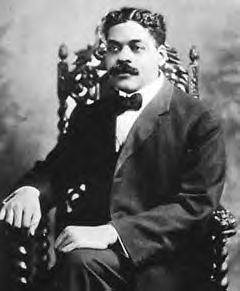In Honor of Black History Month the Puerto Rican Bar Association Celebrates the Life of Afro-Borinqueño Arturo Alfonso Schomburg
(January 24, 1874 – June 10, 1938)

Arturo Alfonso Schomburg described himself as Afro-Borinqueño. He was an activist, writer, educator, and collector nicknamed “the Sherlock Holmes of Negro History” by Jamaican American Historian and Journalist Joel Augustus Rogers.
He was born on January 24, 1874 in Santurce, Puerto Rico, when the island was still a colony of Spain. His mother was Maria Josefa, a Black woman from Saint-Croix, and his father was Carlos Federico, who was born in Puerto Rico of German heritage. In a fifth-grade class, realizing that they did not study anything relating to Black people or history, he asked a teacher if Black people had a history. The teacher said, “No.” It fueled his lifelong work proving the teacher wrong. He was influenced by Puerto Rican abolitionists and nationalists, as well as Salvador Brau, Puerto Rico’s official historian whose work included the contributions of Afro-Puerto Ricans.
Schomburg moved to NYC in 1891, when Puerto Rico was still a Spanish colony and there was just a small Puerto Rican community on the mainland. He was 17 years old, by himself, and found a community of politically active Cubans, who advocated for Cuban independence from Spain, such as José Martí. He was a co-founder of a political independence group, Las Dos Antillas (1892), and a member of other organizations including a Masonic Lodge called El Sol de Cuba (1892) and the Puerto Rican Section of the Cuban Revolutionary Party. At the conclusion of the Spanish-American War in 1898, Cuba gained independence, Puerto Rico became a colony of the United States, and the independence movements faded.
Schomburg’s attention turned to amassing his now world acclaimed collection of literary works and art by people of Africa and African origins from across the globe, demonstrating their contributions and achievements. He worked at a law office but could not take the bar because he lacked educational documentation. He ultimately worked at Bankers Trust Company for over twenty years and worked his way up to Supervisor of the Caribbean and Latin America Mail Section. He became known for his ever-growing collection and research and co-founded the Negro Society for Historical Research, in 1911, which aimed to support Pan-Africanism and African, West Indian, and Afro-American scholarly efforts.
Schomburg was also a pioneer calling for the establishment of a Chair of Black History and Black Studies programs in our schools and colleges. He said, “We need the historian and philosopher to give us with trenchant pen, the story of our forefathers, and let our soul and body, with phosphorescent light, brighten the chasm that separates us. We should cling to them just as blood is thicker than water.” In 1920, he became the president of the American Negro Academy and served until 1928; according to some accounts, some questioned if he was Black enough given his background. He had also become Master of his Masonic Lodge and Grand Secretary of its New York State Grand Lodge, all while raising a family and amassing his collection which he freely shared. Schomburg was one of the most prominent, though perhaps less well-known, figures of the Harlem Renaissance and a father of Black History. He was widowed twice and must have had incredible support from his three wives.
Schomburg stands as an embodiment of the power of cultural unity, a living testament to the strength found in embracing one’s heritage while fostering connections across borders. Arturo Schomburg not only preserved history but also ignited a flame that continues to illuminate the diverse and often overlooked contributions of Afro-Latinos within the broader context of the African diaspora.
See this short video about how important the Schomburg Center is to artists like Harry Belafonte, historians, writers, educators, students, etc.:
For resources and more about Schomburg and his extensive collection, which was purchased by the New York Public Library and housed at the Schomburg Center for Research in Black Culture in Harlem, follow these links: https://www.nypl.org/locations/schomburg
